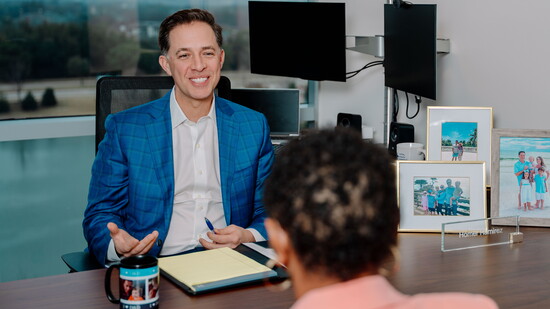For local DFW resident Homer Ramirez, helping clients build their family wealth was rooted in his own family’s trauma. “I was not given education about money or wealth from my parents. My mother sold out of the market at the bottom of the tech bubble in 2001, and my father failed to invest in equities in his 401k at all.” But this was just the start of his story, not the end. Despite his own financial missteps in his twenties, Homer was able to support himself through college.
As he matured, he was intrigued by financial markets and financial planning. “I vowed to become financially savvy and teach my family how to build and manage family wealth so I could provide opportunities to my kids that I never had,” Homer recalls. In his practice, Homer has a big mission: “Empower families to live their best lives in retirement and build generational family wealth through education, an integrated wealth management process, and a handholding service model.”
To share his knowledge, Homer answered a few questions to help educate others.
What are some of the most common investment mistakes you see, and how can they be avoided?
The first mistake is investing without a plan. Financial plans that align investments with your goals can help take emotions out of investing and help you to avoid buying and selling at the wrong time. Focusing on the timeline of the goal helps investors stick with their investment plan through the ups and downs of the market. This keeps you from chasing returns and changing your investment to what did good last year.
The other mistake is not diversifying. After all, diversification is the holy grail of investing. Diversification means not picking one stock or one sector. Instead, make sure you invest across multiple asset classes, industries, and geographic regions that are uncorrelated or have low correlation. Picking 30 different stocks that would all perform poorly if interest rates rose or if a certain policy was passed is not diversifying your risk because they’re all positively correlated, meaning they all go up and down together.
Finally, you can’t ignore fees and tax drag. Fees and taxes can eat into your investment returns which, over time, can mean less wealth accumulation. Working with a professional that is an investment fiduciary, meaning someone who has a legal obligation to act for the beneficiary’s benefit--not their own--can help educate you on the fees and tax impacts that may not be apparent at first glance.
How do you help clients navigate the complexities of tax planning as they approach retirement or pass wealth to the next generation?
I help by ensuring my clients understand their taxes. Texas is a community property state, which means married couples can benefit from a full step-up in basis on certain appreciated assets. Knowing the tax laws and working with a wealth advisor and tax professional who does can help with titling assets appropriately to take advantage of this huge tax saver when transferring wealth to family.
I also help my clients consider charitable giving. Giving feels good and helps our communities while also giving us a tax benefit. However, there are more options to gifting than just writing a check. By utilizing some lesser known strategies like donor-advised funds, philanthropic goals and wealth creation can both be accomplished.
What role does estate planning play in your investment advice for your clients?
Estate planning is the foundation of every financial plan, and yet it is commonly overlooked. For wealthy families, poorly executed estate plans, or no plan at all, can cause a burden to others. We ensure that when passing on wealth, there will not be surprising negative outcomes. For beneficiaries that rely on government disability income, leaving assets in their name can have the unintended consequence of disqualifying them from their much-needed government disability benefits.
Homer Ramirez is the Senior Vice President for Ramirez Family Wealth of Raymond James. You can learn more about him at RamirezFamilyWealth.com.
Disclaimer:
The information contained in this newsletter does not purport to be a complete description of the securities, markets, or developments referred to in this material. The information has been obtained from sources considered to be reliable, but we do not guarantee that the foregoing material is accurate or complete. Any opinions are those of Homer Ramirez and not necessarily those of Raymond James. Expressions of opinion are as of this date and are subject to change without notice. There is no guarantee that these statements, opinions or forecasts provided herein will prove to be correct. Investing involves risk and you may incur a profit or loss regardless of strategy selected, including diversification and asset allocation. Past performance does not guarantee future results. Future investment performance cannot be guaranteed, investment yields will fluctuate with market conditions.
Donors are urged to consult their attorneys, accountants or tax advisors with respect to questions relating to the deductibility of various types of contributions to a Donor-Advised Fund for federal and state tax purposes. Raymond James and its advisors do not offer tax or legal advice. You should discuss any tax or legal matters with the appropriate professional.
Raymond James & Associates, Inc., member New York Stock Exchange/SIPC.
Pull Quote: "Financial plans that align investments with your goals can help take emotions out of investing and help you to avoid buying and selling at the wrong time."
